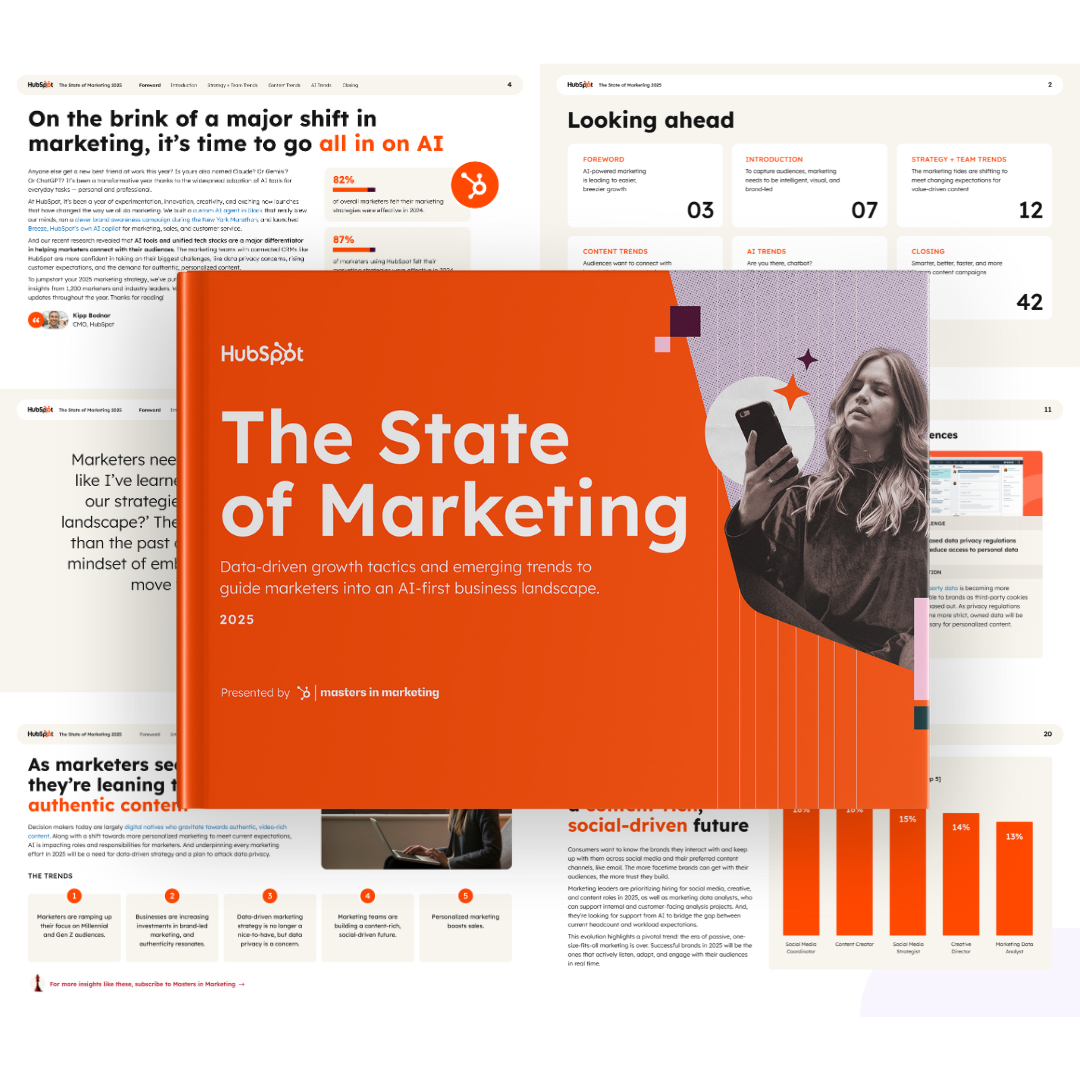2024 was a year to remember.
For one, there were enormous strides in AI that resulted in massive shifts across the marketing industry. (Many marketers compare AI innovations to the industrial revolution. No big deal or anything.)
Download Now: Free State of Marketing Report
[Updated for 2025]
Aside from AI, Google's EEAT search ranking factors shook up content strategies, redefining online visibility.
Even consumer buying behaviors evolved significantly, with shoppers becoming more attentive to brand values and increasingly favoring campaigns that align with their personal ideals.
As we stand on the brink of 2025, it‘s crucial for marketers to pause and reflect on the year’s biggest challenges and prepare for the future.
Below, let's review the current global marketing issues impacting the industry, according to data from HubSpot’s 2025 Marketing Report and insights from marketing experts.
Or jump to whichever top challenge you're most curious about:

The State of Marketing in 2025
HubSpot's Annual Inbound Marketing Trends Report
- Top Marketing Channels
- AI in Marketing
- Managing Privacy
- The Future of Marketing
Download Free
All fields are required.

Top Challenges Marketers' Faced in 2024 — Plus, Expert Insights on How to Navigate Those Challenges in 2025
1. Customer Targeting
Over the past 12 months, marketing efforts towards Boomers and Generation X have hit an all-time low. This decline indicates a much-needed strategic recalibration as companies reassess where to allocate their marketing resources for maximum impact.
The shift away from targeting older generations is evident even across industries. For business-to-consumer (B2C), Gen X targeting dropped from 67% in 2023 to 41% in 2024; as business-to-business (B2B) sectors had a similar fall in Gen X targeting from 68% to 43% over the same period.
Why It's a Challenge
Shifting demographic focus can mean an almost complete overhaul of how teams market their product or service — and shifting tactics can come with uncertainty.
Appealing to changing cultural or behavioral differences can challenge businesses reliant on their pre-existing brand image. For example, older generations may have established brand loyalties that can be difficult to change.
Younger audiences may be more skeptical and selective, placing a premium on authenticity — but there are some cases as recent as November 2024 with brands like Jaguar, that took a big swing in rebranding and following an ethos that shocked many luxury car consumers nationwide.
Rawdon Glover, Jaguar's managing director, shared his thoughts on the new brand transformation behind its TYPE 00, stating, “We have forged a fearlessly creative new character for Jaguar that is true to the DNA of the brand but future-facing, relevant, and one that really stands out.”
While it's too soon to call, this brand is one of countless that are taking on the challenge of adapting to changing audiences and bravely targeting those who are newly introduced to the brand or are more into a fresh (or even bold) future.
What You Can Do
Freshen up your team‘s market research and data analytics to understand an expanding audience’s preferences, behaviors, and needs.
While there's no one-size-fits-all solution for every persona you may be trying to reach, familiarize yourselves with the latest industry trends and content preferences that customers are gravitating towards in 2025.
2. Knowing the Social Issues Your Audience Cares About
Consumers want brands to be socially responsible — in fact, 45% of people think that brands need to do more to advocate for social justice issues.
The brands that take a stance on social issues that matter to their audience will have an easier time connecting with their prospects and customers. People want to buy from brands that care about things that matter to them.
Consider Warby Parker. I've been purchasing sunglasses from Warby Parker for years. I won’t go anywhere else. Why? Because of their Buy a Pair, Give a Pair program, which donates one pair of glasses per pair bought and, to date, has distributed over 10 million glasses.
Why It's a Challenge
Roughly one-third (28%) of marketers say their biggest challenge is a lack of information on the social causes their target audience cares about (e.g. environmentalism, racial justice).
Simply put, it can be difficult to discern which social causes matter most to your target audience. This information is a little more nuanced than age, gender, or location.
Additionally, you want the cause to align with your brand values. Your audience might care deeply about climate change, but that cause might not have a natural connection with your brand personality.
To authentically connect with your audience around social issues, it's critical that they make sense for your business, as well.
What You Can Do
Like most marketing activities, the key to success here lies in market research.
You'll want to conduct thorough research to better understand your customers on a deeper level – including what they value most.
Surveys can be strong opportunities to explore these more nuanced conversations with your buyer persona and understand what matters to them. However, people aren't always going to feel comfortable sharing the social issues they care most about, since they are often very personal.
In these cases, leveraging social listening tools to glean insights into the social issues your audience discusses the most on social media could be a strong first step.
HubSpot's Manager of Community Strategy & Operations Jenny Sowyrda told me, "My number one tip for understanding what your community values is to listen to your community. Your community is telling you what they care about through every interaction — from clicking links in an email to re-sharing a social post."
Sowyrda adds, “Additionally, you should actively listen by connecting with your community members directly. Start a list of members, both the loudest and the quietest folks in the room, and build trust with them through individual conversations focused on learning what they care about.
By combining your understanding of your community members with your unique expertise, you can provide value and cater to their needs.”
Once you‘ve determined what your community values, you’ll want to figure out which social issues overlap with your brand. Authenticity here is key, and so is action.
For instance, perhaps you consider partnering with a non-profit that also supports that social issue to show you're willing to walk the walk. Again, ensuring the social issue makes sense for your brand to support is critical, as well.
Patagonia is a good example here. Their brand emphasizes the importance of environmental sustainability, and it works because a) the social issue is a good match for Patagonia‘s target audience (active, outdoors-y people), while also aligning well with their brand values; and b) they’ve invested in environmental and social responsibility programs to demonstrate a true, genuine desire to create change.
3. Facilitating Strong Sales and Marketing Alignment
Strong sales and marketing alignment is critical for any successful organization. And yet, it's undeniably challenging to facilitate strong communication to help these two teams work better together.
Which is why a whopping one-third (35%) of marketers say a lack of effective communication between sales and marketing is their top challenge.
Why It's a Challenge
Many sales and marketing teams work in silos at larger organizations. Bridging the gap between the two teams — particularly when those teams have different priorities and are unclear of their shared goals — can be difficult, especially when neither team feels motivated to do so.
Additionally, the two teams might implement separate data and analytics processes, making it hard to share data consistently and retrieve insights that help both sales and marketing determine what's working and what isn’t.
But alignment is critical to your business' success in 2025. Organizations with tightly aligned sales and marketing teams see 27% faster profit growth, and 36% higher customer retention.

What You Can Do
To explore how you can foster stronger sales and marketing alignment, I spoke with Monica Elgemark, Chief Marketing Officer at Oneflow.
She told me, “To address this challenge, it's imperative to define clear goals and objectives that both sales and marketing teams can rally behind.
Clear goals and objectives that differentiate between awareness and revenue should be considered in order for both sales and marketing to understand the values different campaigns bring. It is a mutual dependency between these areas that needs respect.”
Beyond identifying shared goals, Elgemark emphasizes the importance of transparent communication between teams. Regular meetings and collaboration tools are helpful, but they're just that – tools. To truly facilitate alignment, your team needs to implement and continuously nourish a collaborative culture.
Data plays a key role, as well. As Elgemark puts it, “Sharing data and analytics represents an essential facet of this alignment process. Implementing a robust customer relationship management (CRM) system, accessible to both teams, allows for the exchange of invaluable customer data.
This data not only informs marketing strategies but also empowers sales teams to better comprehend and engage with leads.”
Finally, Elgemark encourages marketers to seek out feedback from the sales team. Ask your sales team about the quality and readiness of your leads, which will ultimately help you hone in on the marketing activities that drive the most revenue for the business.

The State of Marketing in 2025
HubSpot's Annual Inbound Marketing Trends Report
- Top Marketing Channels
- AI in Marketing
- Managing Privacy
- The Future of Marketing
Download Free
All fields are required.

4. Hiring Top Talent
The strength of your marketing team starts and ends with the talent you employ.
While it's one of the most important components of a strong marketing team, it’s also one of the most challenging aspects.
In fact, when it comes to hiring, 35% of marketers report finding candidates with the right skillset is their top challenge.
Why It's a Challenge
2023 saw some major challenges when it came to hiring. For one, there was higher demand for skilled workers, which led to higher wages and benefits for workers and increased competition among employers to attract top talent.
Additionally, many employees have shifted their priorities and now seek out companies with strong work-life balance and company culture. Many also prefer the option for remote or hybrid work. If your organization doesn't offer these benefits, you’ll likely find it harder to attract top talent.
These challenges will continue to infiltrate hiring and retention in 2025.
What You Can Do
HubSpot's Senior Recruiter Kaleigh Hoffman told me a strong partnership between the hiring managers and talent acquisition team is critical for attracting top talent iA 2024.
She says, "A recruiter’s best email or InMail message is never as flattering as direct outreach from a hiring manager, so if you are willing to write a personalized note — it really goes a long way. During a time when AI is making it easier and faster to write anything, personalized outreach can make the difference in someone responding or not.
If you are writing to a ‘rockstar’ candidate, keep in mind that they want to know why you are reaching out to them, so be sure to include why you are interested in their profile, specifically."
Hoffman adds that specific job profiles with clearly defined attributes will help set your job descriptions apart from others in the market, which might skew more general.
It's important to remember that recruiting is similar to selling. So, as Hoffman puts it, “If you are speaking with a strong candidate, specifically asking them what they are excited about or looking for in their next role can help you close them in later conversations.
Reminding candidates of their motivators in final conversations — whether it’s benefits, flexibility, or something else — can really help seal the deal.”
Hoffman adds that its important not to get too discouraged if a candidate decides not to pursue a role. Instead, look at rejection as an opportunity to ask that candidate if they have anyone else in their network they think could be a good fit for the role.
As Hoffman puts it, “Recruiting is a long-term initiative. Nurturing the relationships you develop by checking in from time to time is a great way to build a pipeline of super-talented candidates for 2024 and beyond.”
5. Creating Content That Generates Leads
24% of marketers say their top challenge is creating content that generates leads. And yet, it's one of the most important functions of marketing: To ensure the content we create is high-quality, but also impacts the company’s bottom line.
In 2025, we'll see some major changes when it comes to marketers’ content creation strategies.
Why It's a Challenge
Creating lead-generating content has always been a challenge for marketers, but there are some particular reasons why it's especially difficult now.
In 2023, Google released its new EEAT search quality evaluator guidelines. Why is this significant? Because they added an “E” for experience — which means now, ensuring your content is written by someone with credible, first-hand experience on the topic is vital for increasing your website's value.
AI also greatly transformed how people consume content. Now, people don't have to Google “How can I go viral on TikTok?” — then can ask an AI chatbot. Which means many marketers likely saw major decreases in traffic on some of their more generalized topics in 2023.
AI and EEAT have greatly shifted how we, at HubSpot, create lead-generating content. We've been working to ensure the topics we cover are written by authors with first-hand experience.
We've leaned into personality-driven content, since personality is one thing AI doesn’t have.
And we've begun re-focusing our overarching strategy on more niche topics that pertain directly to our products and services, rather than covering too many broad topics — since a brand that is an expert on “everything” is likely actually an expert on, well … nothing.
What You Can Do
To learn how you can create strong lead-generating content in 2024, I spoke to Zack Khan, the Co-Founder of Feathery and former marketing leader at Hightouch.
He told me, “The challenge and opportunity in 2024 is writing quality content with insights from subject matter experts. There is so much low quality content out there, increased by AI writing tools. The novel ideas and voice (‘hot takes’) that generate leads require a deep connection to the reader's problem that the content is hoping to solve.”
During Khan's eary days at Hightouch, he solved for this challenge by hiring “data evangelists”. These were people in Slack communities who were already sharing their opinions on the latest data trends. Khan recognized the importance in arming himself with writers’ who could share personal insights, rather than simply summarizing the data.
He says, “The hardest part was hiring the right team of subject matter experts, and getting them excited to write content full-time. I expect this to be just as hard to find later. But audiences are starving for unique, opinionated content in the future and the work to recruit a team of subject matter experts does pay off”.
Monica Elgemark believes another key strategy to generating leads in 2025 involves leveraging AI. As she puts it, “A creative and holistic approach is essential for generating traffic and leads.
AI-powered personalization delves deeper than surface-level marketing. Using AI algorithms, marketers can predict and cater to individual prospect interests, and create personalized content that resonates profoundly with the target audience.”
Elgemark also encourages marketers to consider how they might incorporate more interactive content — like quizzes, assessments, or webinars — into their existing strategies to retain traffic and provide additional value.
Elgemark promises: “By delving into these strategies, marketers can confidently navigate the dynamic landscape, remain at the forefront of trends, engage effectively, and ultimately thrive in the ever-evolving realm of B2B marketing.”

6. Gaining and Keeping Followers on Social Media
Nowadays, your audience spends a large portion of their time on social media. And yet, social media is also more oversaturated than ever before.
Which leads us to our fifth challenge: Gaining – and keeping – followers on social media.
Why It's a Challenge
18% of marketers report it's a major challenge for them to gain and keep followers on social media.
This makes sense: Time is precious. Each social media user is going to be selective when it comes to which brands they follow. If they don‘t feel they’re getting consistent value from your social media content, they’ll quickly unfollow to free up their feed for other users’ content.
What You Can Do
Amrita Mathur, VP of Marketing at ClickUp, symphasizes with this challenge and recognizes the importance of audience-building in 2025 and beyond.
Her solution to social media is simple, and yet oftentimes underutilized: Leverage the power of your employees as influencers.
She told me, “While so far, I’ve mostly seen brands working with influencers and creators to further their message and cause, I can see company employees turning into these influencers.”
She continues, “Brands need to recognize that there is no tried-and-tested playbook that works every single time. In my opinion there is one single truth: the answer lies in having a point of view, and knowing how to illustrate that POV in a striking and memorable way.
When you combine this and couple it with tactics for both first time and repeat engagement, you get magic. That repeat engagement is what will turn into buying behavior down the road (assuming product-market fit).”
As she points out, the word ‘influencer’ can make some marketers believe their internal employees don’t make the cut. But influencers can be big or small, niche or broad, and they can also be channel-specific (like Instagram alone) or not.
Mathur adds, “If you haven't already, start thinking about which employees to leverage, curate their unique voice, and get on with the building of your modern-day media strategy.”
Logan Lyles, Evangelism & Content Marketing Manager at Teamwork.com, agrees with Mathur that incorporating ‘evangelists’ — including executives, employees, customers, influencers, and partners — into your marketing activities allows you to surround existing audiences with content from people they already trust.
He told me, "Our strategy has involved co-creating content with influential names in the community of our ICP (agencies & professional service firms), as we tap them to guest on our podcast and speak on our Agency Life webinar series.
We've even partnered with different evangelists to both create and distribute our pillar content pieces via social media."
Here's a quick example of that strategy in action on LinkedIn, where Pete Caputa provided a reaction to data points from Teamwork.com's State of Agency Operations Report and then posted the video Teamwork.com and Pete created together on his personal LinkedIn profile.
Lyles told me Pete's personal post generated nearly 200 combined engagements & comments — well beyond the engagement metrics Teamwork.com typically sees on an average Company Page post.
After exploring all these challenges, I don't want you to get discouraged as we enter the new year.
Is marketing hard?
Marketing can be a challenge, but it can result in opportunities for better visibility, growth, and success for you or your business.
Ultimately, there is no easy solution to these complex, nuanced challenges, but preparing for change is the best way to set yourself up for the year.
Navigating Challenges in 2025 and Beyond
Hopefully, these expert insights can get your team inspired and motivated to test out new strategies in 2025, iterate on existing strategies, and explore the best opportunities for your unique brand to combat these challenges.
Remember — you're not in this alone!
Editor's Note: This post was originally published in November 2012 and has been updated annually to include new, exclusive HubSpot data and expert insights.

The State of Marketing in 2025
HubSpot's Annual Inbound Marketing Trends Report
- Top Marketing Channels
- AI in Marketing
- Managing Privacy
- The Future of Marketing
Download Free
All fields are required.




![Top Marketing Channels in 2025 — Here’s What Your Team Needs to Master [Data]](https://www.hubspot.com/hubfs/marketing%20channel.png)


![What's a Marketing Audit? [+ How To Do One]](https://www.hubspot.com/hubfs/Marketing%20Audit.png)
![2025 CPL and CAC Benchmarks [HubSpot Research]](https://www.hubspot.com/hubfs/cost-per-lead-benchmark-1-20250227-9826989.webp)

![What Are the 4 Ps of Marketing? The Marketing Mix Explained [Example]](https://www.hubspot.com/hubfs/4%20Ps%20of%20Marketing%20FI.png)

